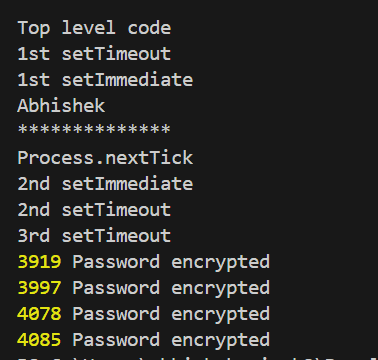As we know, node.js is a single thread. The code will run in this sequence.
- Initialize program
- Top level code get executed
- require modules
- then event callbacks started
- finally the event loop will do it’s work
Note: When there are heavy tasks then event loop send those to thread pool.
Thread pool
- There are additional 4 threads or more.
- It handle expensive (heavy) tasks like compression, cryptography, etc.
Avoid blocking the event loop
- Avoid using sync versions of functions in fs, crypto, zlib modules in the callback functions.
- Avoid complex calculations for example – loop inside loop.
const fs = require("fs");
const crypto = require("crypto");
const startTime = Date.now();
process.env.UV_THREADPOOL_SIZE = 4;
setTimeout(() => console.log("1st setTimeout"), 0);
setImmediate(() => console.log("1st setImmediate"));
fs.readFile("test-file.txt", () => {
console.log("Abhishek");
console.log("**************");
setTimeout(() => console.log("2nd setTimeout"), 0);
setTimeout(() => console.log("3rd setTimeout"), 3000);
setImmediate(() => console.log("2nd setImmediate"));
process.nextTick(() => console.log("Process.nextTick"));
crypto.pbkdf2("password", "salt", 100000, 1024, "sha512", () => {
console.log(Date.now() - startTime, "Password encrypted");
});
crypto.pbkdf2("password", "salt", 100000, 1024, "sha512", () => {
console.log(Date.now() - startTime, "Password encrypted");
});
crypto.pbkdf2("password", "salt", 100000, 1024, "sha512", () => {
console.log(Date.now() - startTime, "Password encrypted");
});
crypto.pbkdf2("password", "salt", 100000, 1024, "sha512", () => {
console.log(Date.now() - startTime, "Password encrypted");
});
});
console.log("Top level code");
Output:





